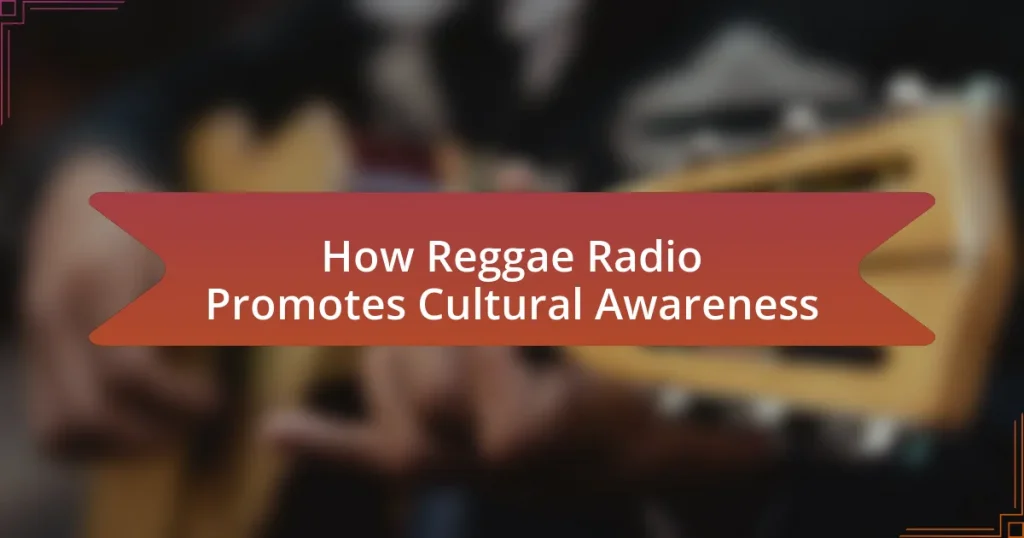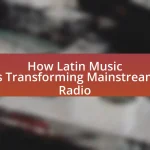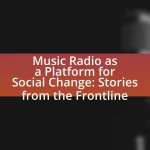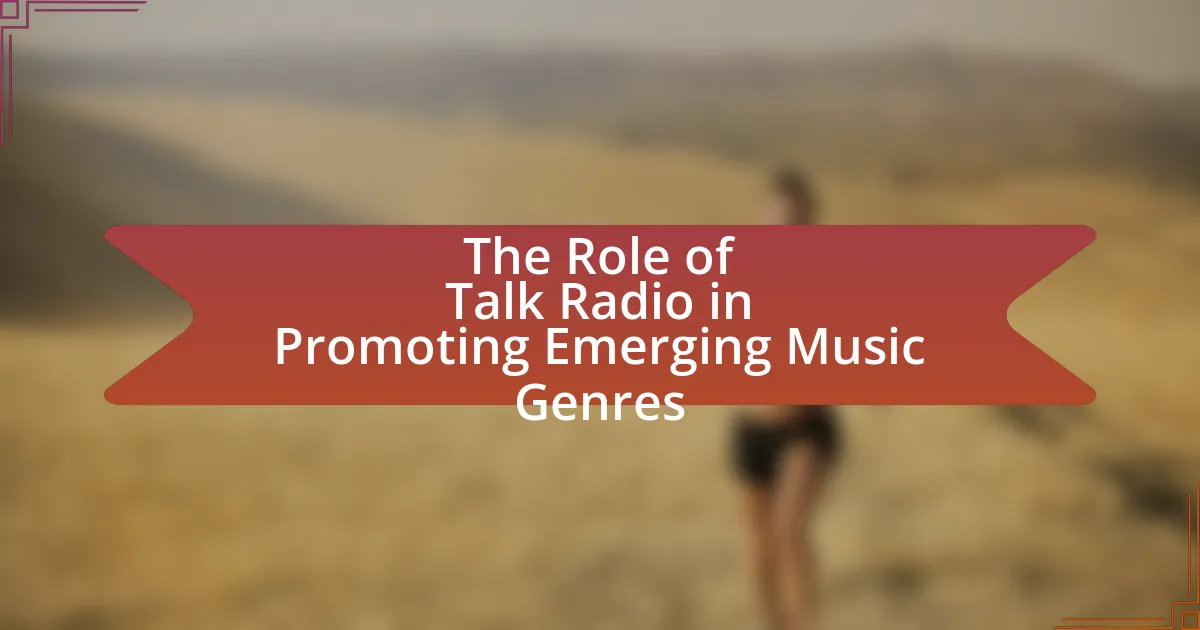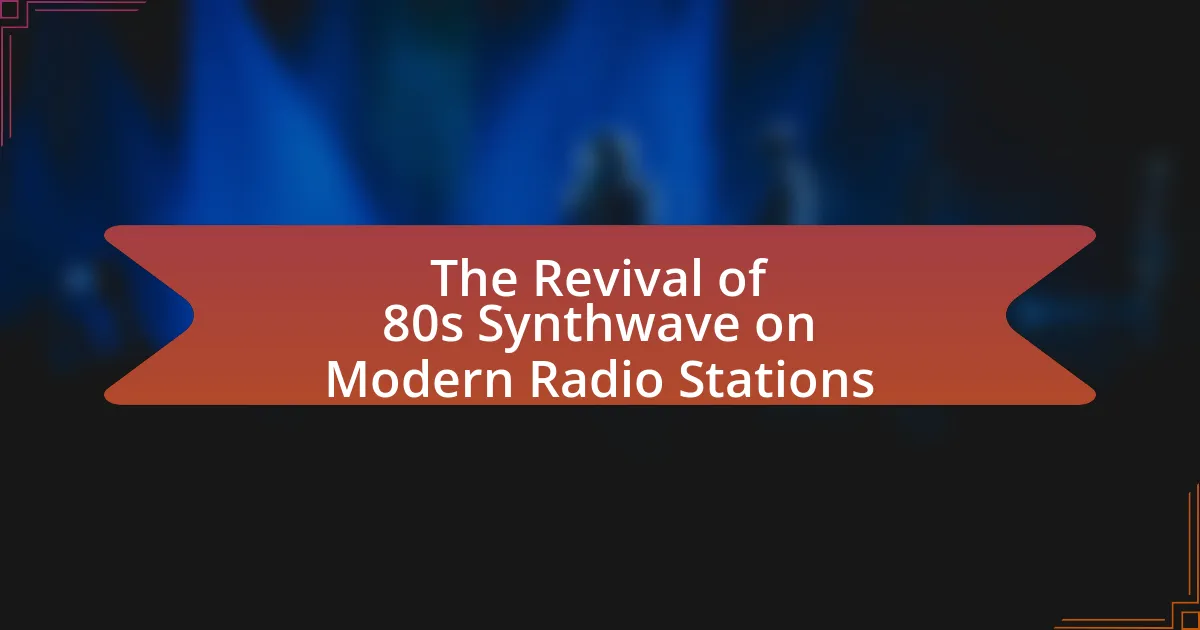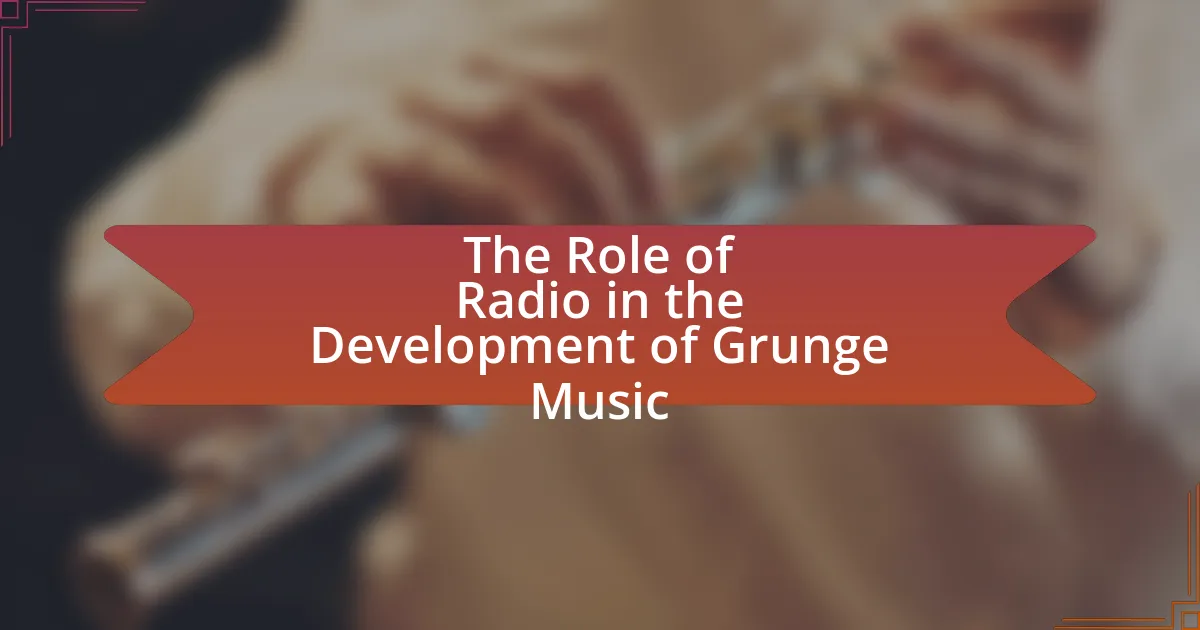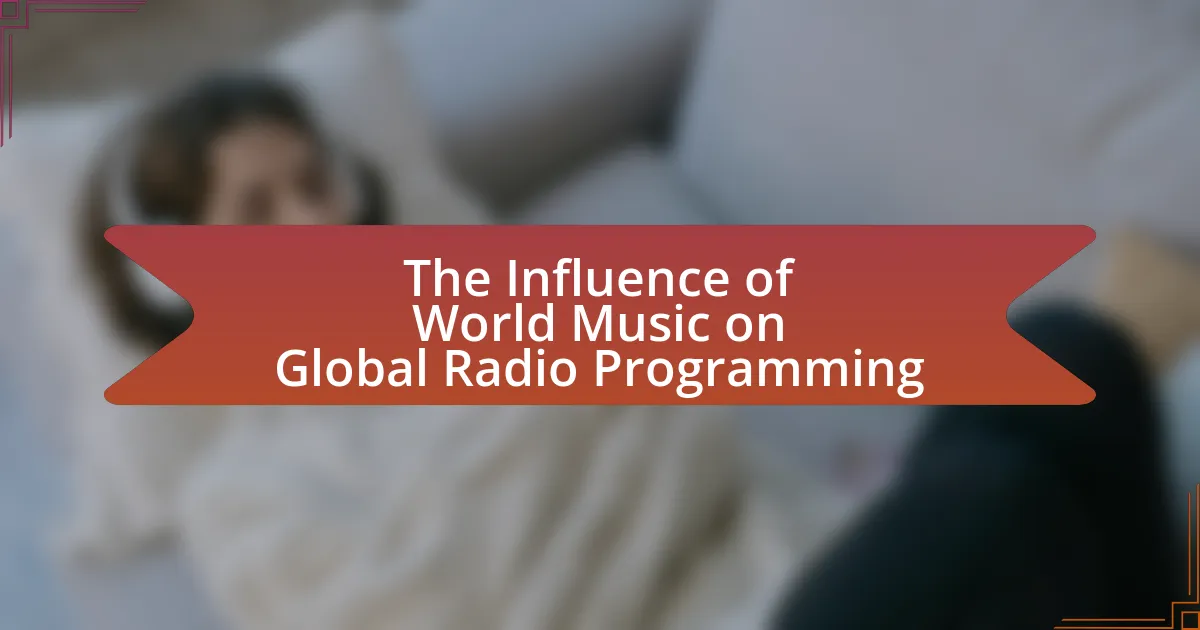Reggae Radio serves as a vital platform for promoting cultural awareness by broadcasting music and messages that reflect the values and struggles of Jamaican culture and the African diaspora. It addresses social issues such as inequality and identity, fostering a deeper understanding among listeners. The historical roots of Reggae Radio trace back to Jamaica in the late 1960s, where it emerged from the reggae music movement, influenced by Rastafarian culture. Through its programming, Reggae Radio not only preserves cultural narratives but also engages communities and promotes activism, while facing challenges such as funding and regulatory restrictions. The global reach of Reggae Radio further enhances cultural awareness, allowing diverse audiences to connect with its messages of unity and social justice.
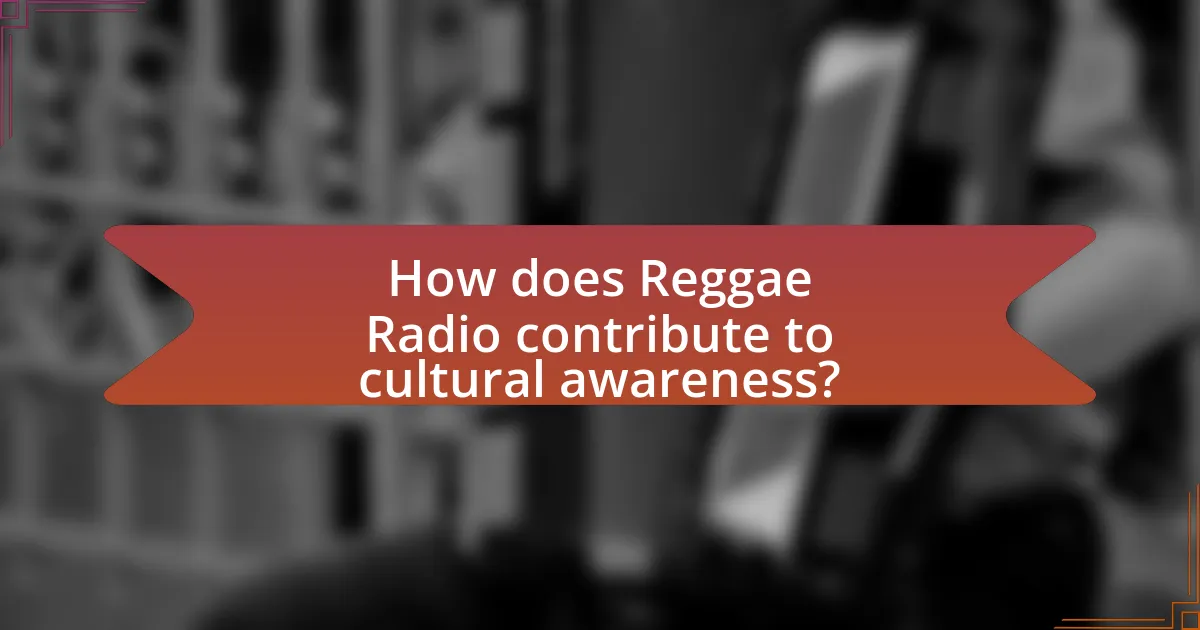
How does Reggae Radio contribute to cultural awareness?
Reggae Radio contributes to cultural awareness by broadcasting music and messages that reflect the values, struggles, and history of Jamaican culture and the broader African diaspora. This genre often addresses social issues such as inequality, resistance, and identity, fostering a deeper understanding of these themes among listeners. For instance, songs by artists like Bob Marley have highlighted the importance of unity and social justice, which resonate globally and educate audiences about the cultural significance of reggae. Additionally, Reggae Radio serves as a platform for cultural exchange, introducing diverse audiences to Jamaican Patois and traditions, thereby enhancing appreciation for the culture.
What are the historical roots of Reggae Radio?
Reggae Radio has its historical roots in Jamaica during the late 1960s, emerging from the broader reggae music movement that combined elements of ska and rocksteady. The establishment of radio stations like Radio Jamaica and the influence of sound systems played a crucial role in popularizing reggae music, which often addressed social and political issues. The genre’s connection to Rastafarian culture further shaped its identity, as it became a medium for expressing cultural pride and resistance against colonialism. This historical context underscores how Reggae Radio not only disseminated music but also fostered cultural awareness and community identity among listeners.
How did Reggae music emerge as a cultural expression?
Reggae music emerged as a cultural expression in Jamaica during the late 1960s, rooted in earlier musical styles such as ska and rocksteady. This genre reflected the social and political struggles of the Jamaican people, particularly the Rastafarian movement, which emphasized themes of resistance, identity, and spirituality. The incorporation of socially conscious lyrics and rhythms resonated with the experiences of marginalized communities, making reggae a powerful vehicle for cultural identity and awareness. The global spread of reggae, particularly through artists like Bob Marley, further solidified its role as a significant cultural expression, promoting messages of unity and social justice.
What role did Jamaican culture play in the development of Reggae Radio?
Jamaican culture significantly influenced the development of Reggae Radio by providing the musical styles, social themes, and linguistic elements that define the genre. The emergence of reggae music in the late 1960s, rooted in ska and rocksteady, was closely tied to the cultural identity of Jamaica, reflecting the island’s struggles, spirituality, and social issues. Reggae Radio became a platform for artists to express these cultural narratives, promoting messages of resistance, unity, and social justice, which resonated with both local and global audiences. The use of Patois, a Jamaican Creole language, in lyrics and broadcasts further solidified the cultural authenticity of Reggae Radio, making it a vital medium for cultural expression and awareness.
How does Reggae Radio promote cultural identity?
Reggae Radio promotes cultural identity by broadcasting music and messages that reflect the values, struggles, and heritage of the Jamaican people and the broader African diaspora. This genre of music often incorporates themes of resistance, social justice, and unity, which resonate deeply with listeners and foster a sense of belonging. For instance, artists like Bob Marley have used reggae to address issues such as poverty and inequality, reinforcing cultural narratives that celebrate resilience and community. Additionally, Reggae Radio serves as a platform for local artists, ensuring that traditional sounds and contemporary expressions of Jamaican culture are preserved and shared, thus strengthening cultural identity among listeners.
What messages are conveyed through Reggae music on the radio?
Reggae music on the radio conveys messages of social justice, resistance against oppression, and cultural pride. These themes are often rooted in the historical context of Jamaica, where reggae emerged as a voice for marginalized communities. Songs frequently address issues such as poverty, inequality, and political struggles, reflecting the experiences of those facing systemic challenges. For instance, artists like Bob Marley have used their music to promote messages of unity and empowerment, emphasizing the importance of love and solidarity among people. This cultural expression not only raises awareness about social issues but also fosters a sense of identity and belonging within the community.
How do artists use Reggae Radio to express cultural narratives?
Artists use Reggae Radio to express cultural narratives by incorporating themes of social justice, identity, and resistance into their music. This genre serves as a platform for artists to share stories that reflect the struggles and triumphs of their communities, often addressing issues such as poverty, inequality, and political oppression. For instance, songs by artists like Bob Marley and Peter Tosh have historically highlighted the Rastafarian movement and the fight against colonialism, thereby fostering a sense of cultural pride and awareness among listeners. Reggae Radio amplifies these messages, reaching a wide audience and promoting cultural understanding through its unique blend of rhythm and lyrical depth.
What impact does Reggae Radio have on community engagement?
Reggae Radio significantly enhances community engagement by fostering a sense of belonging and cultural identity among listeners. This genre of music often addresses social issues, promotes local events, and encourages participation in community activities, thereby strengthening social ties. For instance, studies have shown that community radio stations, including those focused on reggae, often serve as platforms for local voices, allowing residents to share their stories and concerns, which in turn cultivates a more active and informed community. Additionally, reggae music’s roots in social justice and activism resonate with audiences, motivating them to engage in community initiatives and cultural celebrations.
How does Reggae Radio foster a sense of belonging among listeners?
Reggae Radio fosters a sense of belonging among listeners by creating a communal space where shared cultural values and experiences are celebrated. This genre of music often emphasizes themes of unity, resistance, and social justice, resonating deeply with audiences who identify with these messages. For instance, the lyrics of reggae songs frequently reflect the struggles and triumphs of marginalized communities, allowing listeners to connect on a personal level. Additionally, Reggae Radio often features local artists and cultural events, further reinforcing community ties and encouraging listener participation. This engagement cultivates a collective identity, making listeners feel part of a larger movement that values their heritage and experiences.
What community events are promoted through Reggae Radio stations?
Reggae radio stations promote various community events such as music festivals, cultural celebrations, and local artist showcases. These events often highlight reggae music’s roots and its influence on cultural identity, fostering community engagement and cultural awareness. For instance, events like the Reggae Sumfest in Jamaica attract thousands, showcasing local talent and celebrating the genre’s heritage, thereby reinforcing the cultural significance of reggae within the community.
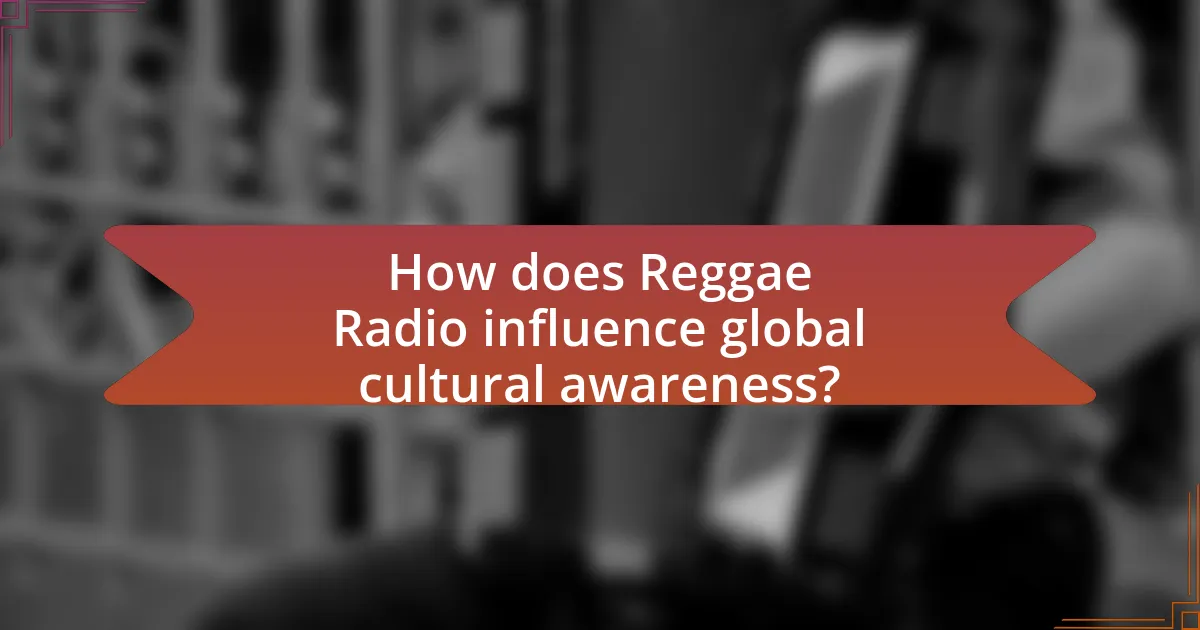
How does Reggae Radio influence global cultural awareness?
Reggae Radio influences global cultural awareness by disseminating Jamaican culture and social issues through its music and messaging. This genre often addresses themes such as resistance, unity, and social justice, which resonate with diverse audiences worldwide. For instance, artists like Bob Marley have used reggae to promote messages of peace and equality, leading to increased awareness of Rastafarian culture and the struggles faced by marginalized communities. Furthermore, the global reach of reggae radio stations allows for cross-cultural exchanges, fostering appreciation and understanding of different cultural perspectives.
What is the reach of Reggae Radio beyond Jamaica?
Reggae Radio has a significant reach beyond Jamaica, with broadcasts available in various countries across the globe. This genre of music has gained popularity in regions such as the United States, Canada, Europe, and Africa, where numerous radio stations and online platforms feature reggae programming. For instance, the International Reggae Day initiative highlights the global influence of reggae, showcasing its presence in over 80 countries. Additionally, streaming services and social media platforms have further expanded the accessibility of reggae music, allowing audiences worldwide to engage with Jamaican culture and its messages of social justice and unity.
How do international audiences engage with Reggae music through radio?
International audiences engage with Reggae music through radio by tuning into both local and international stations that feature Reggae programming. These radio stations often curate playlists that highlight popular Reggae artists and genres, providing listeners with access to a diverse range of Reggae music. For instance, platforms like BBC Radio 1Xtra and SiriusXM’s The Joint offer dedicated Reggae shows, which not only play music but also discuss the cultural significance and history of the genre. This engagement fosters a deeper understanding of Jamaican culture and the socio-political themes often present in Reggae music, thereby promoting cultural awareness among global listeners.
What collaborations exist between Reggae artists and global musicians?
Collaborations between Reggae artists and global musicians include notable partnerships such as Bob Marley and The Wailers with Eric Clapton on the song “I Shot the Sheriff,” which helped introduce reggae to a wider audience. Additionally, Sean Paul has collaborated with international stars like Beyoncé on “Baby Boy” and Snoop Dogg on “Get Busy,” further blending reggae with pop and hip-hop genres. Another significant collaboration is Damian Marley’s work with Nas on the album “Distant Relatives,” which merges reggae with hip-hop and addresses social issues. These collaborations demonstrate reggae’s influence and its ability to transcend cultural boundaries, promoting cultural awareness globally.
How does Reggae Radio address social issues?
Reggae Radio addresses social issues by using music and dialogue to raise awareness about topics such as poverty, inequality, and human rights. Through lyrics that often reflect the struggles of marginalized communities, reggae artists highlight social injustices and encourage listeners to engage in activism. For instance, songs by artists like Bob Marley and Peter Tosh have historically tackled issues like racial discrimination and political oppression, fostering a sense of solidarity among listeners. Additionally, radio programs often feature discussions and interviews that delve into current social challenges, providing a platform for community voices and promoting cultural awareness.
What themes related to social justice are prevalent in Reggae music?
Reggae music prominently features themes of social justice, including resistance to oppression, advocacy for equality, and the promotion of human rights. These themes are often expressed through lyrics that address issues such as poverty, racial discrimination, and political corruption. For instance, artists like Bob Marley have used their music to highlight the struggles of marginalized communities, emphasizing the need for social change and unity. The historical context of reggae, emerging from Jamaica in the 1960s during a time of social upheaval, further reinforces its role as a voice for the oppressed, making it a powerful medium for cultural awareness and activism.
How do radio programs highlight activism within the Reggae community?
Radio programs highlight activism within the Reggae community by featuring music and discussions that address social justice issues, human rights, and political struggles. These programs often play songs that contain powerful messages about resistance and empowerment, such as tracks by artists like Bob Marley and Peter Tosh, who are known for their activism. Additionally, radio hosts frequently invite activists and community leaders to share their insights and experiences, creating a platform for dialogue and awareness. This approach not only educates listeners about pressing societal issues but also fosters a sense of solidarity within the community, reinforcing the cultural significance of Reggae as a vehicle for activism.
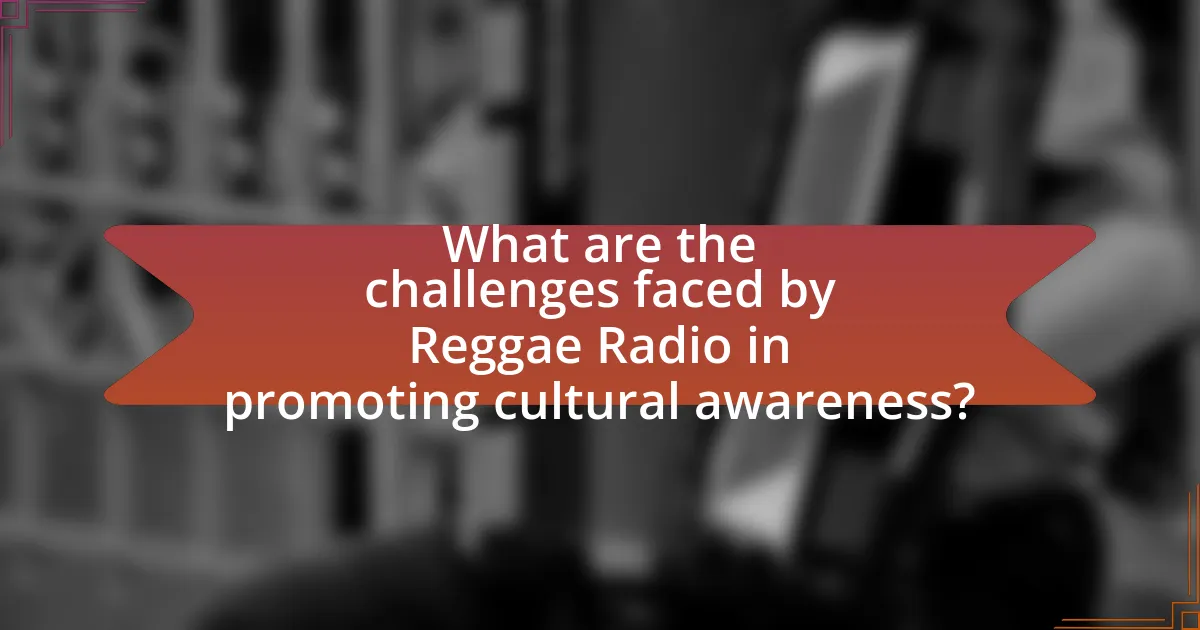
What are the challenges faced by Reggae Radio in promoting cultural awareness?
Reggae Radio faces several challenges in promoting cultural awareness, primarily due to limited funding and resources. These financial constraints hinder the ability to produce high-quality content and reach wider audiences. Additionally, regulatory restrictions on broadcasting can limit the diversity of programming, making it difficult to fully represent the rich cultural heritage of reggae music. Furthermore, competition from mainstream media and digital platforms often overshadows reggae stations, reducing their visibility and impact. According to a study by the University of the West Indies, many reggae radio stations struggle to maintain listener engagement due to these factors, which ultimately affects their role in cultural education and awareness.
How do technological changes affect Reggae Radio’s reach?
Technological changes significantly enhance Reggae Radio’s reach by enabling broader access to audiences through digital platforms. The advent of streaming services and social media allows Reggae Radio stations to broadcast globally, reaching listeners who may not have access to traditional radio frequencies. For instance, platforms like Spotify and YouTube have made Reggae music accessible to millions worldwide, increasing its popularity and cultural impact. Additionally, mobile applications and internet radio have facilitated on-demand listening, allowing fans to engage with Reggae content anytime and anywhere, thus expanding the genre’s audience base and cultural awareness.
What platforms are emerging as alternatives to traditional Reggae Radio?
Emerging platforms that serve as alternatives to traditional Reggae Radio include streaming services like Spotify, Apple Music, and YouTube, as well as dedicated online radio stations such as Reggae Radio Network and Dubwise Radio. These platforms allow users to access a broader range of reggae music and related content, often featuring curated playlists and user-generated content. For instance, Spotify has seen a significant increase in reggae playlists, reflecting the genre’s growing popularity and accessibility. Additionally, online radio stations provide niche programming that focuses specifically on reggae culture, further promoting cultural awareness and engagement within the community.
How do these changes impact cultural representation in Reggae music?
Changes in Reggae music, particularly through the influence of digital platforms and globalization, enhance cultural representation by broadening the reach of diverse voices within the genre. This evolution allows artists from various backgrounds to share their unique experiences and perspectives, thereby enriching the cultural tapestry of Reggae. For instance, the rise of online streaming services has enabled artists from regions outside Jamaica, such as Africa and Europe, to contribute to the genre, reflecting a more globalized cultural narrative. This shift not only diversifies the themes and messages in Reggae music but also fosters a greater understanding and appreciation of different cultural contexts among listeners.
What regulatory challenges do Reggae Radio stations encounter?
Reggae radio stations encounter regulatory challenges primarily related to licensing and content restrictions. These stations must navigate complex broadcasting regulations that vary by country, often requiring specific licenses to operate legally. For instance, in the United States, the Federal Communications Commission (FCC) mandates compliance with rules regarding content, including restrictions on explicit language and copyright laws that affect music broadcasting. Additionally, reggae radio stations may face challenges in securing airtime due to competition with mainstream media, which can limit their ability to promote cultural awareness effectively.
How do licensing issues affect the broadcasting of Reggae music?
Licensing issues significantly hinder the broadcasting of Reggae music by creating barriers for radio stations to legally play tracks. These barriers arise from the need to obtain proper licenses from copyright holders, which can be complex and costly. For instance, the performance rights organizations (PROs) that manage licensing for music often require radio stations to pay fees based on their audience size and the number of songs played, leading to financial constraints that may limit the diversity of Reggae music aired. Additionally, the lack of clear licensing agreements can result in legal repercussions for broadcasters, discouraging them from featuring Reggae artists and thereby impacting cultural representation.
What measures can be taken to support Reggae Radio stations?
To support Reggae Radio stations, funding initiatives can be established to provide financial resources for operational costs. These stations often rely on donations, grants, and sponsorships to sustain their programming, which promotes cultural awareness. For instance, the National Endowment for the Arts has previously funded community radio projects, demonstrating the effectiveness of financial support in enhancing local cultural programming. Additionally, partnerships with local businesses can create sponsorship opportunities that benefit both the radio stations and the sponsors, fostering a community-centric approach.
What are best practices for promoting cultural awareness through Reggae Radio?
Best practices for promoting cultural awareness through Reggae Radio include featuring diverse reggae artists, sharing educational content about Jamaican history and culture, and engaging with the community through events and discussions. By showcasing a variety of reggae musicians from different backgrounds, radio stations can highlight the genre’s global influence and cultural significance. Educational segments can provide listeners with insights into the socio-political context of reggae music, such as its roots in resistance and social justice movements. Additionally, hosting community events and discussions fosters dialogue and understanding among listeners, further enhancing cultural awareness. These practices are supported by the genre’s historical role in promoting messages of unity and cultural pride, making reggae radio a powerful medium for cultural education.
How can Reggae Radio stations engage with their communities effectively?
Reggae radio stations can engage with their communities effectively by hosting local events and collaborating with community organizations. These stations can organize concerts, cultural festivals, and educational workshops that celebrate reggae music and its cultural significance, fostering a sense of community and belonging. For instance, a study by the University of the West Indies found that community-based events significantly enhance local participation and cultural pride, demonstrating the positive impact of such initiatives. Additionally, by featuring local artists and discussing community issues on air, reggae radio stations can create a platform for dialogue and representation, further strengthening their connection with the audience.
What strategies can be implemented to enhance cultural programming?
To enhance cultural programming, integrating community engagement initiatives is essential. These initiatives can include workshops, cultural exchange programs, and collaborations with local artists to create content that reflects diverse cultural narratives. Research indicates that community involvement fosters a sense of ownership and relevance, which can significantly increase participation and interest in cultural programming. For instance, a study by the National Endowment for the Arts found that programs involving local artists and community members resulted in higher attendance and engagement rates, demonstrating the effectiveness of this strategy in promoting cultural awareness through mediums like reggae radio.
